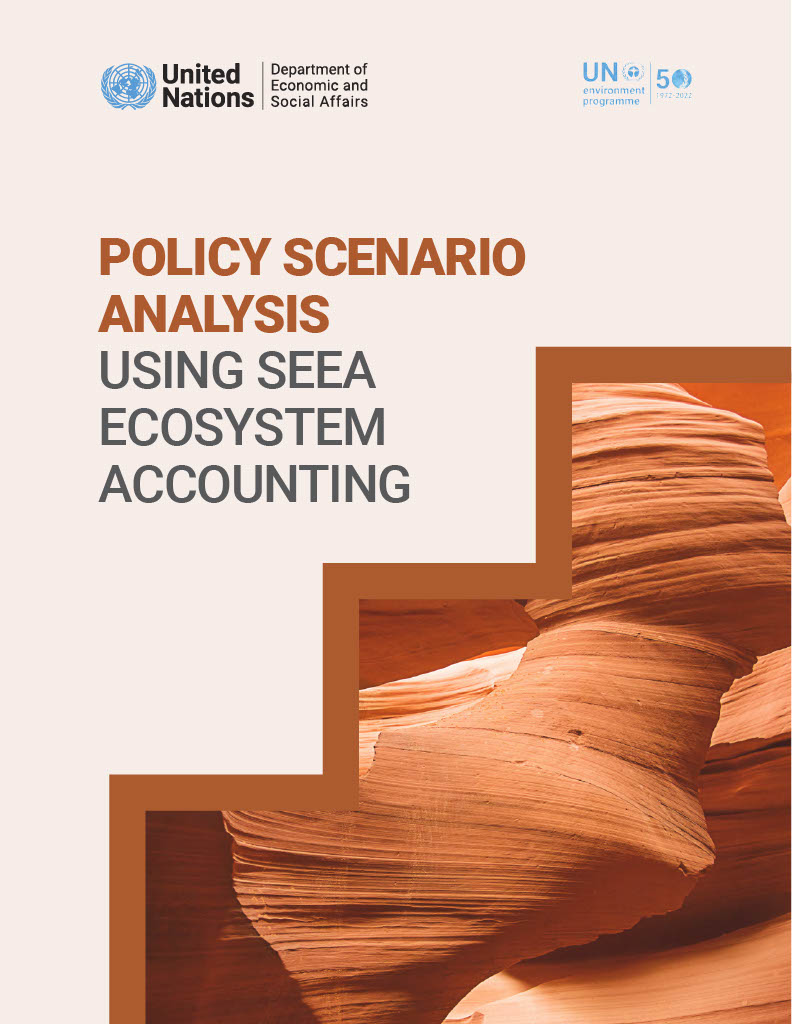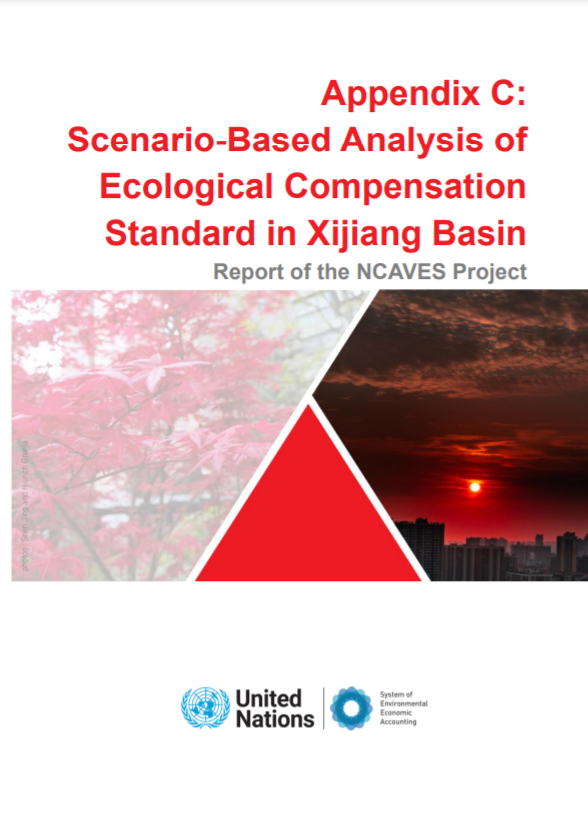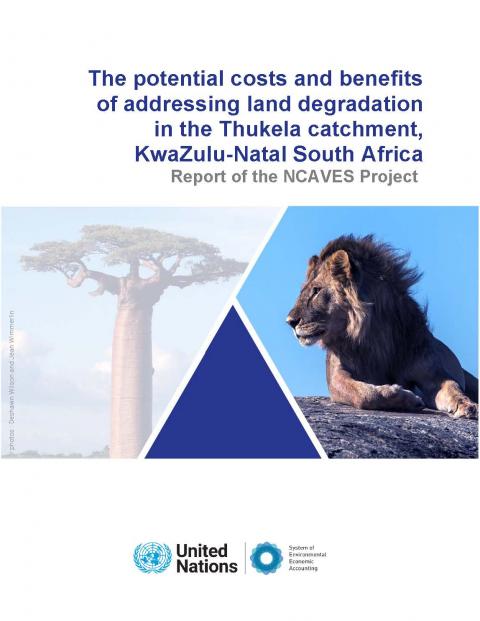Scenario Analysis
Overview
The System of Environmental-Economic Accounting—Ecosystem Accounting (SEEA EA) was recently adopted by the united Nations Statistical Commission at its 52nd session in March 2021.
Following this significant milestone, a key dimension to increasing the uptake of the accounts is mainstreaming their application into policymaking. In response to this need, a technical report, Policy Scenario Analysis Using SEEA Ecosystem Accounting, has been developed. The report is an output of the Natural Capital Accounting and Valuation of Ecosystem Services (NCAVES) project, funded by the European Union.
The objective of the report is to improve the effectiveness of decisions for sustainable development by highlighting how use of the SEEA EA accounts in scenario analysis models can provide policymakers with a better understanding of the interconnections between society, economy and the environment, and hence lead to better decisions. The report provides an overview of how to link the ‘data push’ from the development of accounts with the ‘policy pull’ demand for information by policymakers. This report shows that policy scenario analysis can be informed or improved by applying ecosystem accounts in different types of models and modelling approaches. The report includes: an overview of core concepts and dimensions in scenario design; a technical review of state-of-the-art methods and simulation models for scenario analysis; and policy-relevant content to create an explicit link between the use of models and policymaking, based on successful country examples. Country examples are drawn from existing literature and studies undertaken as part of the NCAVES project in China and South Africa.
The report was prepared by Dr. Andrea Bassi under the guidance of UNEP and UNSD and was peer reviewed by experts on the SEEA EA and its policy applications.
A preliminary version of the report was presented to the African NCA Community of Practice; a recording of this webinar is available here.
The final report was launched during the Fifth Policy Forum on Natural Capital Accounting for Better Decsion Making.
Publications
Supplementing the technical report, the following case studies enable policy-makers to evidence the use of ecosystem accounts (and associated data) in environmental policy formation and evaluation, through deployment of the SEEA Ecosystem Accounting statistical framework and different types of modelling approaches.
Key Case Studies
- Green Economy Models applications in Indonesia, Mauritius, Cambodia, and Mozambique (Bassi, 2015)
- Green Economy Modelling of ecosystem services in the Dawna Tenaserim Landscape, in the Greater Mekong (Bassi et al., 2014)
- Economic value of ecosystem services in Pelly’s Lake and the Stephenfield reservoir, Manitoba, Canada (Bassi et al., 2019)
- Economic value of restoring the ecological health of Beira Lake in Colombo, Sri Lanka (IISD, 2019)
- Analysing conservation options using the Sustainable Asset Valuation Methodology in Lake Dal, India (IISD, 2018)
- Analysing aquatic rehabilitation options for Lake Dal in Srinagar, India (IISD, 2018)
- Sustainable asset valuation of irrigation infrastructure in the Southern Agricultural Growth Corridor of Tanzania (IISD, 2018)
- Biophysical modelling and economic valuation in the Rufiji River Basin and Kilombero Valley, Tanzania (TEEB, 2018)
- Low Carbon Development Initiative for Indonesian natural, human, social, and physical capital (BAPPENAS, 2019)
- Integrated economic-environmental modelling framework for Guatemala’s forest and fuelwood sectors (Banerjee et al., 2016)
- Forest certificates markets for cost-effective biodiversity conservation in São Paulo State, Brazil (Bernasconi et al., 2016)
- Mapping LULC in the Cerrado-Atlantic Forest ecotone region, in the Prata River Basin, Brazil (da Cunha et al., 2020)
- Estimating crop water needs for sustainable water resources management in Kerala, India (Surendran et al., 2017)
- Modeling landscape dynamics of policy interventions in Karnataka State, India (Setturu and Ramachandra, 2021)
- Ecosystem services and Sumatran tiger conservation and habitats (Bhagabati et al., 2014)
- Integrated fisheries management in Belize and The Bahamas (Arkema et al., 2019)
The Economics of Ecosystems and Biodiversity (TEEB)
A TEEB Country Study (TCS) the ecosystem services that are vital to meeting the country’s policy priorities and makes recommendations on how these services can be integrated into policies. These recommendations depending on the country context can include policies for poverty alleviation, subsidy reform, land use management, protected area management, securing livelihoods, investment in natural infrastructure restoration and national accounting to include natural capital. Examples for Bhutan, Ecuador, Philippines, Liberia and Tanzania and other TEEB-inspired studies are available on the TEEB website: http://teebweb.org/where-we-work/.
The TEEB for Agriculture and Food project applies scenario analysis to policy decisions in the food and agriculture sector: http://teebweb.org/our-work/agrifood/
Other Examples
- Achieving the SDGs of zero hunger and clean water and sanitation in Guatemala, applying IEEM platform (Banerjee et al., 2019)
- “Roads from Rio+25” pathways assessment to achieve the SDGs (Moyer and Bohl, 2018)
- Conservation planning, species distribution, and connectivity analysis in Peru (Fajardo et al., 2014)
- Ecosystem service assessment for the United States Forest Service (Neugarten et al., 2018)
- Predictive spatial modelling for biodiversity and ecosystem services in live cycle assessments (Chaplin-Kramer et al., 2017)
- Using science and management methods and tools for conservation, in the Bita River Ramsar Site, Colombia (Suárez et al., 2021)
- Nitrogen reduction assessment using InVEST in the Jiulong River Watershed, China (Yan et al., 2018)
- Regional impacts of the 2002-2003 Australian drought (Horridge et al., 2005)
- Large-scale hydrological modelling of the Upper Paraná River Basin (Rafee et al., 2019)
- Adaptation of future water shortages in the United States (Brown et al., 2019)
- Rainfall-runoff and water-balance models for management of the Fena Valley Reservoir, Guam (Yeung, 2005)
- Ecosystem service dynamics assessment for the Albemarle-Pamlico watershed and Massachusetts Ocean, United States (Boumans et al., 2015)
- Future urban sprawl and landscape change in the Laguna de Bay Area, Philippines (Iizuka et al., 2017)
- Hydropower-food nexus in the Mekong (Pittock et al., 2016)
- Technology and social visions for Europe’s energy future (Jørgensen et al., 2006)
- Achieving the SDGs in the Nigerian power sector (Roche et al., 2020)
NCAVES Project
Brazil, China, India, Mexico and South Africa are advancing the theory and practice of environmental and ecosystem accounting through the innovative multi-year project Natural Capital Accounting and Valuation of Ecosystem Services (NCAVES), funded by European Union through a Partnership Instrument, and implemented by the United Nations Statistics Division, in collaboration with the UN Environment TEEB office and the secretariat of the Convention on Biological Diversity (CBD).




